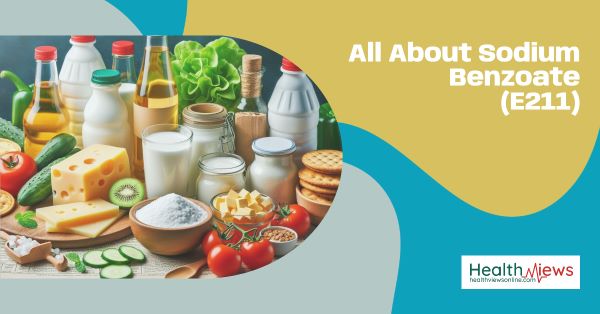Food preservation is a crucial aspect of the food industry, ensuring the safety and longevity of processed foods. Sodium Benzoate E211 is a common food preservative used to inhibit the growth of bacteria, yeast, and mold in various food and beverage products. While it is effective in extending shelf life, there are concerns regarding its safety and potential health effects. This article provides a comprehensive understanding of Sodium Benzoate, including its definition, sources, applications, associated risks, regulatory status, and strategies for minimizing exposure. (Source)
What is Food Preservative Sodium Benzoate E211?
Sodium Benzoate (E211) is a synthetic compound derived from benzoic acid, which occurs naturally in many fruits, including berries and apples. It is primarily produced through the chemical reaction of benzoic acid with sodium hydroxide. Sodium Benzoate is a white, crystalline powder that is highly soluble in water and commonly used as a food preservative due to its antimicrobial properties. (Source)
What are the Sources of Sodium Benzoate E211?
Sodium Benzoate is synthesized through chemical processes and is commercially available as a powder or granular form. It is commonly used as a food additive in various processed foods and beverages to prevent microbial spoilage and extend shelf life. (Source)
What is the List of Foods Containing Sodium Benzoate E211:
Sodium Benzoate (E211) can be found in a variety of processed foods and beverages, including:
- Soft drinks and fruit-flavored beverages
- Fruit juices and concentrates
- Salad dressings and condiments
- Pickles and relishes
- Jams, jellies, and preserves
- Canned fruits and vegetables
- Syrups and sauces
Why is food Preservative– Sodium Benzoate E211 Used in the Food Industry? What are the Applications
Sodium Benzoate (E211) serves as a versatile food preservative in the food industry by:
- Inhibiting the growth of bacteria, yeast, and mold, thereby preventing spoilage and extending the shelf life of processed foods and beverages.
- Maintaining the freshness and quality of products, particularly those with high water content or pH levels conducive to microbial growth.
- Enhancing food safety by reducing the risk of microbial contamination and foodborne illnesses.
- Facilitating global distribution and storage of food products by minimizing the need for refrigeration and other preservation methods.
The Risky and Harmful side effects of Sodium Benzoate E211 on Human Health are:
While Sodium Benzoate (E211) is generally recognized as safe (GRAS) by regulatory agencies when consumed within recommended levels, some individuals may experience adverse reactions, including:
- Allergic reactions: In rare cases, Sodium Benzoate may cause allergic reactions in sensitive individuals, manifesting as skin rash, itching, or respiratory symptoms. (Source)
- Asthma and respiratory issues: Sodium Benzoate has been associated with exacerbating symptoms of asthma and other respiratory conditions in susceptible individuals, particularly those with pre-existing sensitivities. (Source)
- Potential carcinogenicity: Animal studies have suggested a potential link between high doses of Sodium Benzoate and an increased risk of cancer, particularly when combined with certain food additives or components.
What are the FDA regulations for food Preservative– Sodium Benzoate (E211)?
The U.S. Food and Drug Administration (FDA) regulates the use of Sodium Benzoate (E211) as a food additive and considers it Generally Recognized as Safe (GRAS) when used within specified limits. The FDA sets strict guidelines for the allowable levels of Sodium Benzoate in food and beverage products to ensure consumer safety. (Source)
List of Diseases Associated with High Sodium Benzoate (E211) Levels:
Consuming excessive amounts of Sodium Benzoate (E211) may lead to various health concerns, including:
- Asthma and respiratory issues: Some individuals may experience exacerbation of asthma symptoms or other respiratory issues when exposed to high levels of Sodium Benzoate.
- Allergic reactions: Sensitive individuals may develop allergic reactions, including skin rash, itching, or respiratory symptoms when exposed to high doses of Sodium Benzoate.
- Potential carcinogenicity: Animal studies have suggested a potential link between high doses of Sodium Benzoate and an increased risk of cancer, although human studies have not provided conclusive evidence of carcinogenicity.
How to Minimize the Exposure to Food Preservative– Sodium Benzoate (E211)?
To minimize potential risks associated with Sodium Benzoate (E211) consumption, consider the following recommendations:
- Read food labels carefully and be aware of products containing Sodium Benzoate, particularly if you have sensitivities to food preservatives.
- Limit consumption of processed foods containing Sodium Benzoate and opt for fresh, whole foods whenever possible.
- Be mindful of portion sizes and moderate your intake of foods and beverages containing Sodium Benzoate to reduce the risk of adverse effects on health.
- Advocate for increased transparency in food labeling and greater public awareness of the potential risks associated with food preservatives like Sodium Benzoate.
In conclusion, Sodium Benzoate (E211) is a widely used food preservative that helps maintain the safety and quality of processed foods and beverages. While it is generally considered safe for consumption, concerns remain about its potential health effects, particularly in sensitive individuals. By understanding its sources, applications, associated risks, and regulatory considerations, consumers can make informed choices to promote their health and well-being.

Also, read: All You Need to Know about Artificial Food Color Red 3
Sources and References:
- U.S. Food and Drug Administration (FDA)
- European Food Safety Authority (EFSA)
- National Institutes of Health (NIH)
- World Health Organization (WHO)
- Food and Agriculture Organization of the United Nations (FAO)
- Scientific journals and peer-reviewed research articles.




